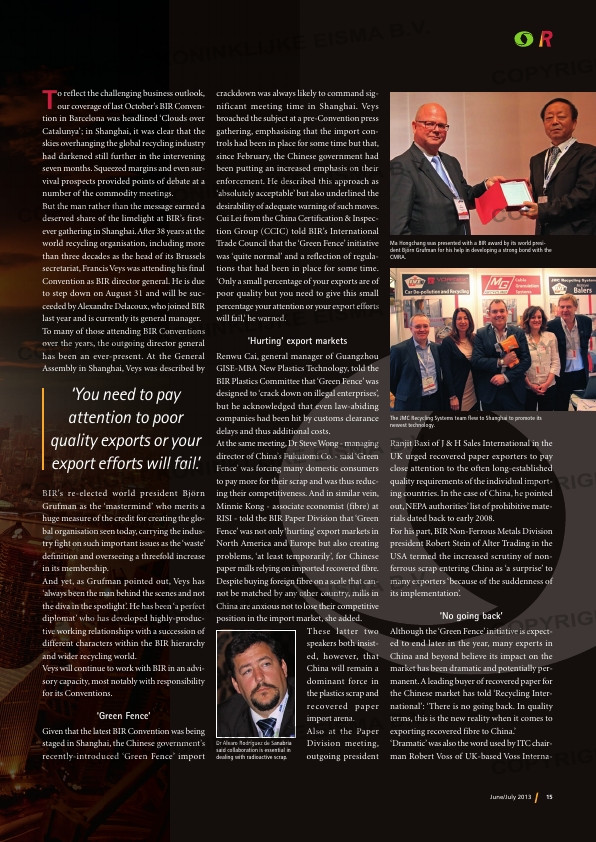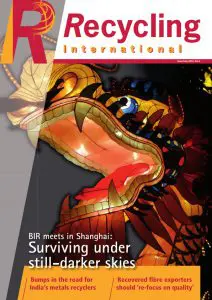Page 15 from: June / July 2013

Surviving
To reflect the challenging business outlook, our coverage of last October’s BIR Conven-
tion in Barcelona was headlined ‘Clouds over
Catalunya’; in Shanghai, it was clear that the
skies overhanging the global recycling industry
had darkened still further in the intervening
seven months. Squeezed margins and even sur-
vival prospects provided points of debate at a
number of the commodity meetings.
But the man rather than the message earned a
deserved share of the limelight at BIR’s first-
ever gathering in Shanghai. After 38 years at the
world recycling organisation, including more
than three decades as the head of its Brussels
secretariat, Francis Veys was attending his final
Convention as BIR director general. He is due
to step down on August 31 and will be suc-
ceeded by Alexandre Delacoux, who joined BIR
last year and is currently its general manager.
To many of those attending BIR Conventions
over the years, the outgoing director general
has been an ever-present. At the General
Assembly in Shanghai, Veys was described by
BIR’s re-elected world president Björn
Grufman as the ‘mastermind’ who merits a
huge measure of the credit for creating the glo-
bal organisation seen today, carrying the indus-
try fight on such important issues as the ‘waste’
definition and overseeing a threefold increase
in its membership.
And yet, as Grufman pointed out, Veys has
‘always been the man behind the scenes and not
the diva in the spotlight’. He has been ‘a perfect
diplomat’ who has developed highly-produc-
tive working relationships with a succession of
different characters within the BIR hierarchy
and wider recycling world.
Veys will continue to work with BIR in an advi-
sory capacity, most notably with responsibility
for its Conventions.
‘Green Fence’
Given that the latest BIR Convention was being
staged in Shanghai, the Chinese government’s
recently-introduced ‘Green Fence’ import
Ranjit Baxi of J & H Sales International in the
UK urged recovered paper exporters to pay
close attention to the often long-established
quality requirements of the individual import-
ing countries. In the case of China, he pointed
out, NEPA authorities’ list of prohibitive mate-
rials dated back to early 2008.
For his part, BIR Non-Ferrous Metals Division
president Robert Stein of Alter Trading in the
USA termed the increased scrutiny of non-
ferrous scrap entering China as ‘a surprise’ to
many exporters ‘because of the suddenness of
its implementation’.
‘No going back’
Although the ‘Green Fence’ initiative is expect-
ed to end later in the year, many experts in
China and beyond believe its impact on the
market has been dramatic and potentially per-
manent. A leading buyer of recovered paper for
the Chinese market has told ‘Recycling Inter-
national’: ‘There is no going back. In quality
terms, this is the new reality when it comes to
exporting recovered fibre to China.’
‘Dramatic’ was also the word used by ITC chair-
man Robert Voss of UK-based Voss Interna-
crackdown was always likely to command sig-
nificant meeting time in Shanghai. Veys
broached the subject at a pre-Convention press
gathering, emphasising that the import con-
trols had been in place for some time but that,
since February, the Chinese government had
been putting an increased emphasis on their
enforcement. He described this approach as
‘absolutely acceptable’ but also underlined the
desirability of adequate warning of such moves.
Cui Lei from the China Certification & Inspec-
tion Group (CCIC) told BIR’s International
Trade Council that the ‘Green Fence’ initiative
was ‘quite normal’ and a reflection of regula-
tions that had been in place for some time.
‘Only a small percentage of your exports are of
poor quality but you need to give this small
percentage your attention or your export efforts
will fail,’ he warned.
‘Hurting’ export markets
Renwu Cai, general manager of Guangzhou
GISE-MBA New Plastics Technology, told the
BIR Plastics Committee that ‘Green Fence’ was
designed to ‘crack down on illegal enterprises’,
but he acknowledged that even law-abiding
companies had been hit by customs clearance
delays and thus additional costs.
At the same meeting, Dr Steve Wong – managing
director of China’s Fukutomi Co. – said ‘Green
Fence’ was forcing many domestic consumers
to pay more for their scrap and was thus reduc-
ing their competitiveness. And in similar vein,
Minnie Kong – associate economist (fibre) at
RISI – told the BIR Paper Division that ‘Green
Fence’ was not only ‘hurting’ export markets in
North America and Europe but also creating
problems, ‘at least temporarily’, for Chinese
paper mills relying on imported recovered fibre.
Despite buying foreign fibre on a scale that can-
not be matched by any other country, mills in
China are anxious not to lose their competitive
position in the import market, she added.
These latter two
speakers both insist-
ed, however, that
China will remain a
dominant force in
the plastics scrap and
recovered paper
import arena.
Also at the Paper
Division meeting,
outgoing president
‘You need to pay
attention to poor
quality exports or your
export efforts will fail.’
Ma Hongchang was presented with a BIR award by its world presi-
dent Björn Grufman for his help in developing a strong bond with the
CMRA.
Dr Alvaro Rodríguez de Sanabria
said collaboration is essential in
dealing with radioactive scrap.
under
still-darker
skies
15June/July 2013
The JMC Recycling Systems team fl ew to Shanghai to promote its
newest technology.
RI-5_BIR intro.indd 15 17-06-13 15:56



